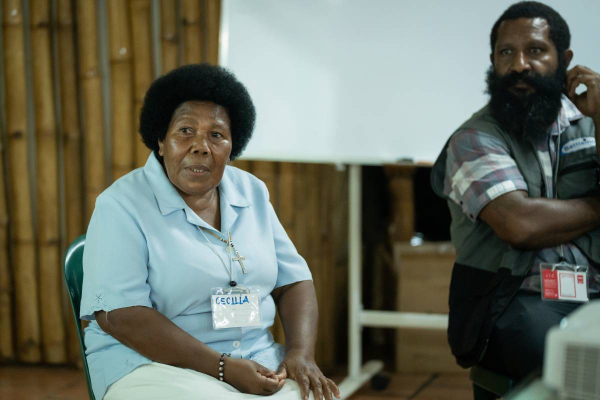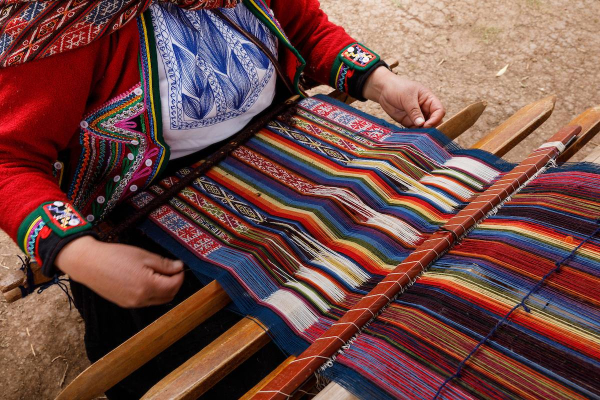Seen by Jesus: Invited Into Dignity

I stand barely five feet tall.
I don’t usually mind being short, but it can make life a bit adventurous as I navigate a world seemingly made for much taller people. Often, not even a step stool is enough for me to reach what I need from our kitchen cabinets, so I balance on the counter.
I meet new people in the grocery store as I stop random shoppers to ask for help getting items down from the top shelf. I get lost between racks of clothes in department stores, and I have to sit on a pillow to see over the dashboards of most cars.
Movie theaters and concerts are the worst. Inevitably, some giant man or a woman with hair reaching for the heavens drops into the seat directly in front of me, unaware that my view is completely blocked.
So in this way, I relate to “wee little man” Zacchaeus.
The Tax Collector
When we meet Zacchaeus in Luke 19, he’s exactly where I would probably be — hanging from branches in a tree to get a peek at excitement beyond a towering crowd:
Being short doesn’t just mean not being able to see past people — it also means not being seen. When I’m surrounded by adults of average height, even my family often won’t realize I’m close until I’m right beside them. I’m used to being accidentally bumped into, tripped over and passed by.
It’s not fun to feel invisible.
I’m sure that Zacchaeus knew the frustration of being overlooked in a crowd; however, he also knew the greater sting of being ignored intentionally. As a dishonest Jewish tax collector for the occupying Roman government, Zacchaeus was shunned by his own people. He knew why his countrymen hated him, and maybe the shame of who he was made him glad at times that people wouldn’t look him in the eye. Shunning is a powerful and painful weapon because it cuts to a core human need: to have our existence acknowledged.
The day Zacchaeus climbed that tree, he probably wasn’t trying to get attention. Scripture says that he was just trying to catch a glimpse of Jesus. But Zacchaeus did capture someone’s attention — Jesus himself. “When Jesus came by, he looked up at Zacchaeus and called him by name. ‘Zacchaeus!’ he said. ‘Quick, come down! I must be a guest in your home today’” (Luke 19:5).
There was Zacchaeus — a guilt-laden outcast, dangling from his last shred of dignity above an uncaring crowd. And there was Jesus, a miracle-working prophet, pausing beneath the tree, looking up and locking eyes with Zacchaeus.
It didn’t matter to Jesus how much of a pariah Zacchaeus was or how much the townspeople grumbled and gossiped — what mattered in that moment was that Jesus saw Zacchaeus. And what mattered to Zacchaeus is that he was seen.
When Jesus noticed Zacchaeus, called him down from the tree and went to be a guest in his home, Jesus was pushing against societal norms and demonstrating that Zacchaeus mattered. Zacchaeus wasn’t the sum of his failures, sins or reputation.
He was a person. He had dignity.
The Samaritan Woman
Zacchaeus wasn’t the only marginalized person who became the focus of Jesus’ attention. As Jesus and his disciples entered the Samaritan town of Sychar on their way to Galilee, Jesus slumped by the well, exhausted from walking in the sun. Just then a Samaritan woman showed up to draw water. Because she was a woman and also part of a rival ethnic group, Jesus would have had culturally justifiable reasons to avoid her.
But she wasn’t just any Samaritan woman — she was notorious. She was the kind of woman who stole husbands, the kind who was the subject of lewd gossip and cautionary tales. She was the kind of woman who would go to the well in the afternoon heat to avoid stares and whispers from her neighbors.
There was the infamous Samaritan woman, shifting uncomfortably under the weight of her water jar and misdeeds. And there was Jesus, looking at her, not with derision or a disappointment, but with a simple, honest request for a drink (John 14:7).
It didn’t matter what shame defined the woman or what Jesus’ closest companions thought. What mattered to Jesus in that moment was that he saw the woman — and what mattered to the woman is that she was seen.
When Jesus ignored centuries of enmity between his people and hers, when he entered into conversation with her at the risk of his own reputation, he showed that the woman had worth. She wasn’t the sum of her shame, dysfunctional relationships or brokenness.
She was a person. She had dignity.
The Dignity of Personhood
Jesus knew that to help people, he first had to acknowledge their value. They needed to know that he saw beyond their labels and circumstances to their priceless humanity.
Jesus noticed people not just to prove a point or stand against the cultural establishment, but because he genuinely cared. His simple acknowledgement of their personhood invited both Zacchaeus and the woman at the well into a level of dignity denied to them by society. Jesus didn’t require them to clean up their messes before he would look at them; instead, his attention drew them toward wholeness.
Standing unhidden before Jesus, clearly seen and completely loved, gave Zacchaeus the courage to admit his corruption and make it right. He announced, “I will give half my wealth to the poor, Lord, and if I have cheated people on their taxes, I will give them back four times as much!” (Luke 19:8b, NLT)
Jesus continued talking with the Samaritan woman, even after he revealed that he knew she was living in adultery following a string of failed marriages. She responded by telling everyone she knew to come see Jesus — a man who had told her all she had done (John 4:29). And when people engage with Jesus on this deeply personal level, they leave the encounter spurred toward life change:
Being seen, acknowledged and known by Jesus gave Zacchaeus and the Samaritan woman a steadiness that allowed them to name, own and move beyond their brokenness rather than be defined and bound by it. They were transformed by their interactions with Jesus because he saw their souls first instead of their stories.
Their shame and labels fell away when they saw who they truly were — people known and valued by the God who made them. Every man, woman and child around the world deserves to know that they are seen and loved by Jesus. But there are still many who have never heard about God's love because they don't have access to his Word in a language and format they can understand. Through the work of Bible translation, people can know just how much they matter to God!
Invited Into Reflection
Ask yourself these questions as you consider the way Jesus loved Zacchaeus and the Samaritan woman:
- What do I believe Jesus sees when he looks at me?
- How would my life change if I lived from a foundation of being seen, known and loved by Jesus?
- What difficult parts of my story is God inviting me to name, own and move beyond?
- Who is one person I've ignored but needs to be seen and invited into dignity?
God is doing amazing things around the world, and you can be a part of seeing people encounter Him through Scripture in a language and format they clearly understand. Join the work by praying with us!






